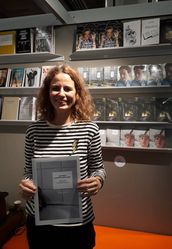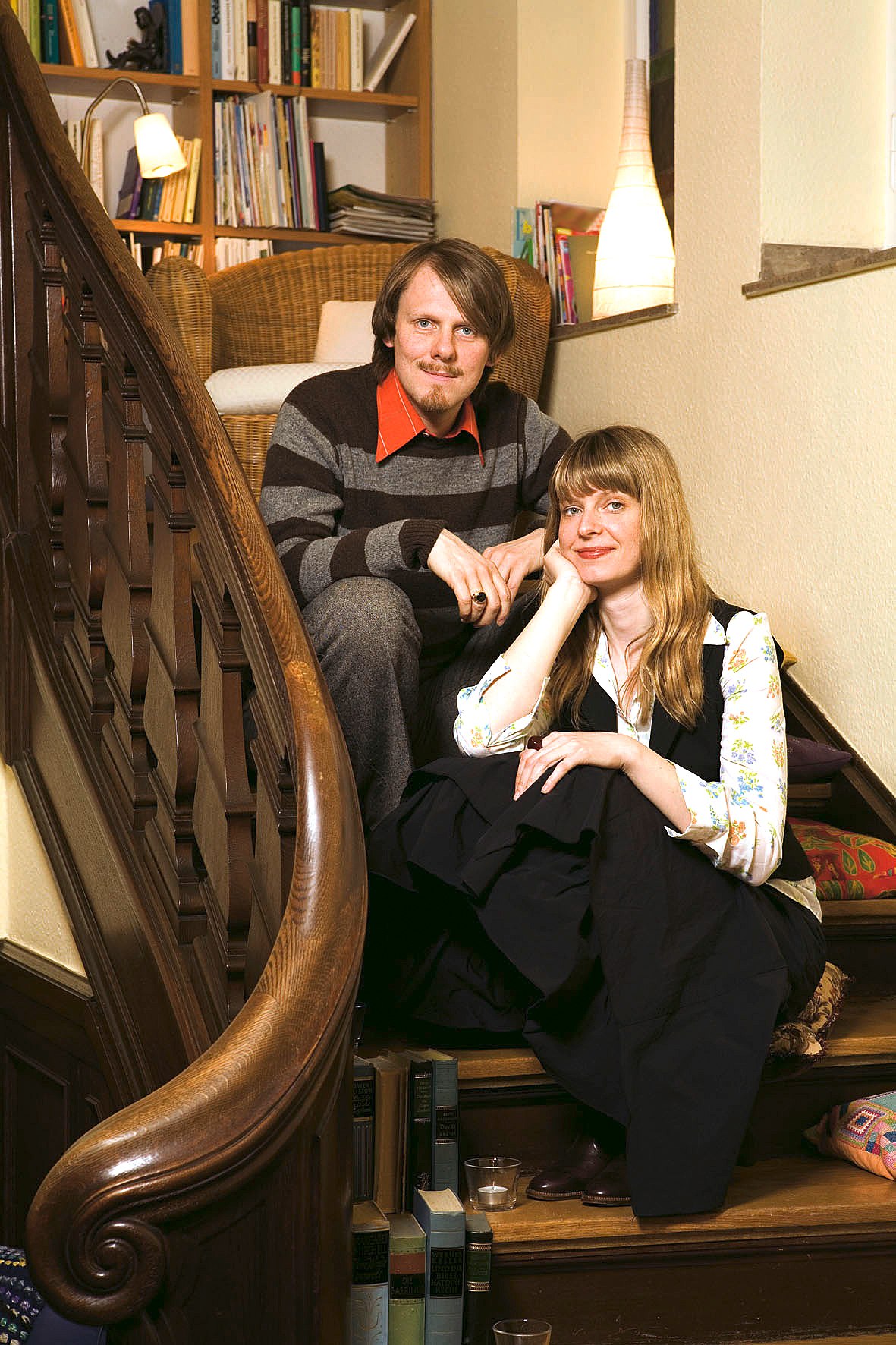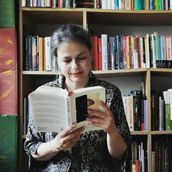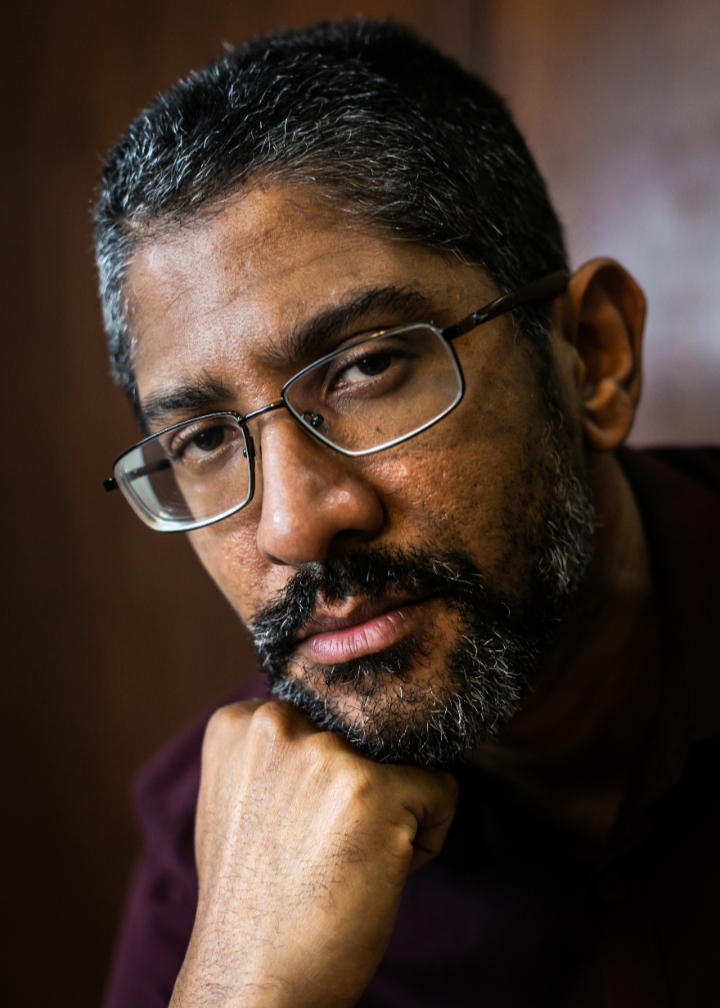Ein Portal des
Literarischen Colloquiums Berlin (LCB)
und des Brandenburgischen Literaturbüros (BLB)

 KW 51
KW 51
Simone Falk
Gunnar Gunnarsson
Advent im Hochgebirge
 KW 46
KW 46
Nkiacha Atemnkeng
Jenny Offill
Amt für Mutmaßungen
 KW 41
KW 41
Rike Bolte
Luis Sepúlveda
Die Welt am Ende der Welt
 KW 37
KW 37
parasitenpresse (Köln)
Eleonore Schönmaier
Wellenlängen deines Liedes
 KW 36
KW 36
w_orten & meer – Verlag für verbindendes diskriminierungskritisches Handeln (Berlin/ Insel Hiddensee)
Sherri Mitchell (Weh’na Ha’mu’ Kwasset – Die das Licht bringt)
Aktivismus heißt Verbindung. Indigene Weisungen zur Heilung der Welt
 KW 34
KW 34
TRANSIT Buchverlag (Berlin)
Peter Henning
DIE TOTE VON SANT ANDREU
 KW 32
KW 32
Verlag Das Wunderhorn (Heidelberg)
Marie-Luise Hiesinger (Hg.)
Wir sind es wert. Eine Anthologie mit 127 Kurzgeschichten
 KW 31
KW 31
Korbinian Verlag (Berlin)
Cemile Sahin
TAXI
 KW 27
KW 27
Linus Giese
Sarah Jäger
Nach vorn nach Süden
 KW 25
KW 25
Valentin Moritz
Beat Sterchi
Blösch
 KW 23
KW 23
Jan Koneffke
Gaito Gasdanow
Nächtliche Wege
 KW 20
KW 20
Madeleine Prahs
Jurek Becker
Am Strand von Bochum ist allerhand los. Postkarten. (Hrsg.: Christine Becker)
 KW 18
KW 18
Samuel Hamen
Thomas Stangl
Die Geschichte des Körpers
 KW 17
KW 17
Regina Menke
Miron Białoszewski
Wir Seesterne
 KW 16
KW 16
Thorsten Dönges
Jürg Federspiel
Die Ballade von der Typhoid Mary
 KW 15
KW 15
Katharina Kohlhaas
Clemens J. Setz
Der Trost runder Dinge
 KW 14
KW 14
Jörg Stübing
Nikos Kazantzakis
Alexis Sorbas
 KW 13
KW 13
Aurélie Maurin
Jakuta Alikavazovic
Das Fortschreiten der Nacht
 KW 6
KW 6
Vasyl Lozynskyi
Liao Yiwu
Massaker. Frühe Gedichte
 KW 50
KW 50
Hartmut Mangold
Richard Ford
Irische Passagiere
 KW 45
KW 45
Berliac
Liao Yiwu
Fräulein Hallo und der Bauernkaiser. Chinas Gesellschaft von unten
 KW 40
KW 40
Cornelia Jentzsch
Jean-Henri Fabre
Erinnerungen eines Insektenforschers (Band I bis X)
 KW 37
KW 37
axel dielmann – verlag (Frankfurt am Main)
Michael Wäser
Familie Fisch macht Urlaub
 KW 35
KW 35
AvivA Verlag (Berlin)
Shelagh Delaney (Herausgegeben von Tobias Schwartz u. André Schwarck)
A Taste of Honey
 KW 34
KW 34
INK Press (Zürich)
Albertine Sarrazin
Querwege
 KW 32
KW 32
mikrotext (Berlin)
O. Westin
Micro Science Fiction
 KW 30
KW 30
Edition Korrespondenzen (Wien)
Gonçalo M. Tavares
3 Bände aus "Das Viertel": "Herr Valéry und die Logik", "Herr Henri und die Enzyklopädie", "Herr Brecht und der Erfolg"
 KW 26
KW 26
Eugene Ostashevsky
Yevgenia Belorusets
Glückliche Fälle
 KW 24
KW 24
Adrian Kasnitz
Bastian Schneider
Paris im Titel
 KW 22
KW 22
Andreas Lehmann
Tobias Wolff
Alte Schule
 KW 20
KW 20
Delphine de Stoutz
Georges Pérec
Versuch einen Platz in Paris zu erfassen
 KW 18
KW 18
Artur Dziuk
Cormac McCarthy
Die Straße
 KW 17
KW 17
Benjamin Maack
Patricia Görg
Glas - Eine Kunst
 KW 16
KW 16
Redfern Jon Barrett
Cory Doctorow
Walkaway
 KW 15
KW 15
Daniela Danz
Annette Ramelsberger, Tanjev Schultz, Rainer Stadler, Wiebke Ramm (Herausgeber)
Der NSU-Prozess. Die Protokolle
 KW 14
KW 14
Johanna Steiner
Annie Ernaux
Erinnerung eines Mädchens
 KW 13
KW 13
Shida Bazyar
Nino Haratischwili
Das achte Leben (Für Brilka)
 KW 49
KW 49
Viktoriya Stukalenko
Dmitrij Kapitelman
Das Lächeln meines unsichtbaren Vaters
 KW 44
KW 44
Deniz Utlu
Tracey Emin
Strangeland
 KW 39
KW 39
Anne Posten
Ulrike Ulrich
Während wir feiern
 KW 37
KW 37
Reprodukt Verlag (Berlin)
Mawil
Kinderland. Eine Kindheit im Schatten der Mauer
 KW 35
KW 35
MONS Verlag (Dresden)
Judith Silverthorne (Erzählt von Ray Lavalle)
Die Würdigung des Bisons. Eine Legende der Plains Cree
 KW 33
KW 33
eta Verlag (Berlin)
Angel Igov
Die Sanftmütigen
 KW 32
KW 32
Hydre Éditions (Bridel/ Luxembourg)
Francis Kirps
Die Mutationen
 KW 30
KW 30
Edition Nautilus (Hamburg)
Annett Gröschner
Berliner Bürger*stuben. Palimpseste und Geschichten
 KW 26
KW 26
Sabine Haupt
Ernst Augustin
Der Kopf
 KW 24
KW 24
Peter Wawerzinek
Magnus Mills
Die Herren der Zäune
 KW 22
KW 22
Rolf Lappert
Paul Auster
4 3 2 1
 KW 20
KW 20
Tom Zille
Marlene Streeruwitz
Jessica, 30.
 KW 18
KW 18
Sophie Wennerscheid
Tania Blixen
Babettes Fest
 KW 17
KW 17
Pieke Biermann
Odile Kennel & Stephanie Haerdle
Hors Texte & Spritzen. Geschichte der weiblichen Ejakulation.
 KW 16
KW 16
Anna Giannessi
Sam Greenlee
The Spook Who Sat by the Door
 KW 14
KW 14
Krischa Hasselbach
Georges Perec
Das Leben. Gebrauchsanweisung
 KW 13
KW 13
Juliana Kálnay
Emma Donoghue
Raum
 KW 12
KW 12
Hanne Reinhardt
Benjamin Quaderer
Für immer die Alpen
 KW 48
KW 48
Ralph Hammerthaler
Stig Sæterbakken / Nino Vetri
Lillehammer – Palermo oder: Suite für eine viertel Kuh
 KW 43
KW 43
Wilfried Bergholz
Mats Ciupka
Kindergeschichten
 KW 38
KW 38
Passagen Verlag (Wien)
Roberto Simanowski (Hg. von Peter Engelmann)
Todesalgorithmus. Das Dilemma der künstlichen Intelligenz
 KW 36
KW 36
Elfenbein Verlag (Berlin)
Tobias Schwartz
Vogelpark
 KW 35
KW 35
Guggolz Verlag (Berlin)
Michail Prischwin
»Дневники Tagebücher«. Band I, 1917 bis 1920
 KW 33
KW 33
Lilienfeld Verlag (Düsseldorf)
Joris-Karl Huysmans
Lourdes. Mystik und Massen
 KW 31
KW 31
Edition A·B·Fischer (Berlin)
Eva Botofte
PERMAFROST. Erzählungen von Spitzbergen
 KW 29
KW 29
Verbrecher Verlag (Berlin)
Alexandra Riedel
SONNE, MOND, ZINN
 KW 26
KW 26
Donat Blum
Ocean Vuong
Auf Erden sind wir kurz grandios
 KW 24
KW 24
Saša Stanišić
Robert Stripling (Hrsg.)
Verpasste Hauptwerke
 KW 22
KW 22
Irina Bondas
Wassili Grossman
Leben und Schicksal
 KW 19
KW 19
Moritz Gagern
Robert Walser
Der Spaziergang
 KW 18
KW 18
Gudrun Ingratubun
Meena Kandasamy
Schläge. Ein Porträt der Autorin als junge Ehefrau
 KW 17
KW 17
Dorian Steinhoff
Thomas Pletzinger
The Great Nowitzki
 KW 15
KW 15
Judith Hermann
Annie Dillard
Außer der Zeit
 KW 14
KW 14
Manuel Niedermeier
Nava Ebrahimi
Das Paradies meines Nachbarn
 KW 13
KW 13
Augusto Paim
Tillie Walden
Pirouetten
 KW 12
KW 12
Annett Gröschner
Jens Bisky
Berlin. Biographie einer großen Stadt
 KW 47
KW 47
Jeferson Tenório
James Baldwin
Ein anderes Land
 KW 42
KW 42
Peter Korneffel
Matthias Glaubrecht
Das Ende der Evolution. Der Mensch und die Vernichtung der Arten
 KW 38
KW 38
duotincta (Berlin)
Moritz Hildt
Alles
 KW 36
KW 36
PalmArtPress Verlag (Berlin)
Frederic Wianka
Die Wende im Leben des jungen W.
 KW 34
KW 34
Osburg Verlag (Hamburg)
Max Jacob
Saint Matorel
 KW 33
KW 33
Matthes & Seitz Berlin
Anne Weber
Annette, ein Heldinnenepos
 KW 31
KW 31
poetenladen Verlag (Leipzig)
Róža Domašcyna & Hans Thill
stimmen aus der unterbühne & Der heisere Anarchimedes
 KW 27
KW 27
Emilia von Senger
James Baldwin
Von dieser Welt
 KW 25
KW 25
Deniz Ohde
Esther Kinsky
Sommerfrische
 KW 23
KW 23
Amanda Michalopoulou
Georgi Gospodinov
Physik der Schwermut
 KW 21
KW 21
Mirna Queiroz
Beatriz Bracher
Die Verdächtigung
 KW 19
KW 19
Juliane Schallau
Eudora Welty
Losing Battles
 KW 17
KW 17
Nora Amin
Annie Ernaux
Die Scham
 KW 16
KW 16
Márta Nagy
László Darvasi
Wintermorgen
 KW 15
KW 15
Hannes Ulbrich
Dag Solstad
Scham und Würde
 KW 14
KW 14
Ismar Hacam
Lejla Kalamujić
Nennt mich Esteban
 KW 13
KW 13
Klaus Ungerer
Nicola Pugliese
Malacqua. Vier Tage Regen über Neapel in Erwartung, dass etwas Außergewöhnliches geschieht.
 KW 12
KW 12
Alexander Graeff
Doris Anselm
Hautfreundin. Eine sexuelle Biografie
